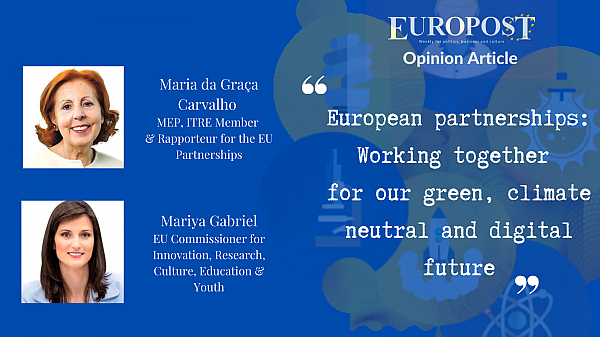Press European partnerships: Working together for our green, climate neutral and digital future
With a total budget of €95,5bn, Horizon Europe will be the world’s largest multi-country research and innovation programme. It comes at a critical moment of the European Union’s history.
The great expectations we, Europeans, have established – addressing climate change, reinforcing our sovereignty, resilience and global competitiveness, anticipating and effectively dealing with health emergencies – would be impossible to accomplish without the transformative power of research and innovation.
We need to achieve unprecedented levels of cooperation, not just between Member States, but also in all other dimensions. Between public and private institutions, between universities, research organisations and the industry, between governments, businesses, regional authorities and citizens. And, above all bringing the research and innovation community together in pan-European collaboration networks.
Strengthening cooperation in key areas by bringing research and innovation actors together is the aim of the 11 partnerships proposed under Horizon Europe programme.
They will speed up the transition towards a green, climate neutral and digital Europe, and make European industry more resilient and competitive. They embody the spirit of broad, large-scale cooperation that is required to fulfil these goals. Also at their core is the objective of building effective ecosystems and maximizing synergies at national and regional levels.
We have significantly simplified the partnership landscape to reduce their number, ensure a more strategic approach and, most importantly, improve their transparency and inclusiveness. We need everyone on board if we are to succeed.
The green and digital transitions will require transformative measures, which cannot happen without the engagement from industry and Member States. It also demands support from the European Union to ensure the development of new breakthrough technologies to transform our industries.
The partnerships will cover areas of strategic importance for Europe: clean hydrogen, high-performance computing, health, digital technologies, metrology, circular economy, transport.
Fifty percent of Horizon Europe’s budget will be dedicated to partnerships. For the nine partnerships establishing joint undertakings, the European Union will provide €10bn of funding that the partners will match with at least an equivalent amount of investment. There is a powerful leveraging effect resulting from the combined contribution, which will create long-term positive impacts on employment, the environment and society.
The success of these partnerships will mean that we will be on the right track to meet our ambitious targets reinforcing our common European project.
In the current context, investing in research and innovation has never been so crucial.
The COVID-19 pandemic has been arguably the greatest challenge Europe has faced since World War II. It had an impact in many dimensions – social, economic, political – and it will be remembered as a testimony of our ability to come together as Europeans.
The partnerships under Horizon Europe will unite industry, researchers, innovators and European nations towards common goals to improve our competitiveness, respond to key societal challenges and to bring Europe to a sustainable recovery. Investing in collaboration is investing in innovation, technological sovereignty and strategic capabilities needed to transform our societies.
We need to strengthen our collaborations, build networks and ecosystems for innovation to flourish. The partnerships will help us to achieve these goals. Only united, we will overcome the crisis.
Mariya Gabriel is the EU Commissioner for Innovation, Research, Culture, Education and Youth.
Maria da Graça Carvalho is a Portuguese Member of the European Parliament, a Member of ITRE Committee and a rapporteur for the European partnerships.
